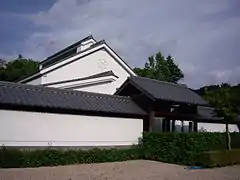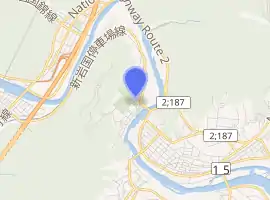Kikkawa Historical Museum
Kikkawa Historical Museum (吉川史料館, Kikkawa Shiryōkan) is a private museum of artefacts handed down by the Kikkawa clan, daimyō of Iwakuni Domain, in Iwakuni, Yamaguchi Prefecture, Japan. Located between Kintai-kyō bridge and Iwakuni Castle and opened by the Kikkawa Hōkōkai Society (吉川報效会) in 1995,[1] the museum's collection totals some seven thousand items, including materials from the Heian and Kamakura periods, a painting attributed to Sesshū, and one National Treasure.[2][3] There are four changing displays each year.[4] Other materials once owned by the Kikkawa clan are on display at Iwakuni Chōkokan.[5]
| Kikkawa Historical Museum | |
|---|---|
吉川史料館 | |
 | |

| |
| General information | |
| Address | 2-7-3 Yokoyama |
| Town or city | Iwakuni, Yamaguchi Prefecture |
| Country | Japan |
| Coordinates | 34°10′14″N 132°10′40″E |
| Opened | November 1995[1] |
| Website | |
| Official website (ja) | |
Highlights of the collection
- Sword known as Kitsunegasaki (狐ヶ崎), from the Kamakura period (National Treasure)[6]
- Spring View from a Thatched Pavilion on the Lakeshore (紙本墨画淡彩湖亭春望図), traditionally attributed to Sesshū Tōyō; with an inscription (賛) by Tenyo Seikei (天与清啓), who journeyed twice on Japanese missions to Ming China, the second time with Sesshū accompanying (Prefectural Tangible Cultural Property)[3][7][8][9]
- Kimono with a design of paths through the mountains, flowers, grasses, tortoises, and cranes (山道草花鶴亀文繡箔胴服), from the Momoyama period; said to have been bestowed upon Kikkawa Hiroie by Toyotomi Hideyoshi in 1587 after his campaign in Kyūshū (Important Cultural Property)[10]
- Kikkawa Family Documents (吉川家文書): 102 items dating from the Kamakura to the Edo period (ICP);[11] a further 32 items, plus a catalogue, from the Meiji period (Municipal Tangible Cultural Property)[12]
- Azuma Kagami: 48 volumes, from the Muromachi period (1522) (ICP)[13]
- Genkō Shakusho: 15 volumes, in the hand of Kikkawa Tsunemoto (吉川経基), from the Muromachi period (ICP)[14]
- Taiheiki: 40 volumes, in the hand of Kikkawa Motoharu, from the Muromachi period (1563–65) (ICP)[15]
- Lotus Sūtra in fine lettering, 8 scrolls: from the Heian period; formerly a temple treasure of Ninna-ji, later presented to Kikkawa Motonaga (吉川元長), as attested in the letter of transfer (ICP)[16][17]
- Portrait of Kikkawa Motonaga (吉川元長)[18]
 Kitsunegasaki (National Treasure)
Kitsunegasaki (National Treasure).jpeg.webp) Spring View from a Thatched Pavilion on the Lakeshore, attributed to Sesshū
Spring View from a Thatched Pavilion on the Lakeshore, attributed to Sesshū
See also
| Wikimedia Commons has media related to Kikkawa Historical Museum. |
References
- 博物館、美術館、資料館、文学館等 [Museums, Museums of Art, Museums of Historical Materials, Museums of Literature, etc] (PDF) (in Japanese). Yamaguchi Prefecture. 1 April 2017. Retrieved 17 August 2020.
- 吉川史料館について [About Kikkawa Historical Museum] (in Japanese). Kikkawa Historical Museum. Retrieved 10 August 2020.
- 雪舟 没後500年特別展 [Sesshu, Master of Ink and Brush: 500th Anniversary Exhibition] (in Japanese). The Mainichi Newspapers. 2002. pp. 259, ix–x.
- 吉川史料館 [Kikkawa Historical Museum] (in Japanese). Agency for Cultural Affairs. Retrieved 18 August 2020.
- 岩国徴古館 [Iwakuni Chōkokan] (in Japanese). Yamaguchi Prefecture. Retrieved 18 August 2020.
- 太刀〈銘為次(狐ヶ崎)〉 [Tachi known as Kitsunegasaki] (in Japanese). Agency of Cultural Affairs. Retrieved 10 August 2020.
- 紙本墨画淡彩湖亭春望図 [Spring View from a Thatched Pavilion on the Lakeshore] (in Japanese). Yamaguchi Prefecture. Retrieved 10 August 2020.
- Miyajima Shinichi 宮島新一 (1990). 吉川家所蔵伝雪舟筆天与清啓賛「湖亭春望図」について [About Spring View from a Thatched Pavilion on the Lakeshore, Attributed to Sesshū and Inscribed by Tenyo Seikei, in the Kikkawa Family Collection]. Museum (in Japanese). Tokyo National Museum. 471: 13–26.
- Itō Kōji 伊藤幸司 (2011). 吉川史料館蔵「湖亭春望図」の著賛時期 [Date of Inscription of Spring View from a Thatched Pavilion on the Lakeshore in the Kikkawa Historical Museum Collection]. Shinano 信濃 (in Japanese). Shinano Historical Society 信濃史学会. 63 (12): 957–968.
- 山道草花鶴亀文繡箔胴服 [Kimono with a design of paths through the mountains, flowers, grasses, tortoises, and cranes] (in Japanese). Agency of Cultural Affairs. Retrieved 10 August 2020.
- 吉川家文書 [Kikkawa Family Documents] (in Japanese). Agency of Cultural Affairs. Retrieved 10 August 2020.
- 市指定文化財一覧 [List of Municipal Cultural Properties] (in Japanese). Iwakuni City. 13 March 2020. Retrieved 10 August 2020.
- 吾妻鏡〈四十七冊並ニ年譜一冊/〉 [Azuma Kagami] (in Japanese). Agency of Cultural Affairs. Retrieved 10 August 2020.
- 元亨釈書〈吉川経基筆/〉 [Genkō Shakusho (brushwork by Kikkawa Tsunemoto)] (in Japanese). Agency of Cultural Affairs. Retrieved 10 August 2020.
- 太平記〈吉川元春筆/〉 [Taiheiki (brushwork by Kikkawa Motoharu)] (in Japanese). Agency of Cultural Affairs. Retrieved 10 August 2020.
- 細字法華経八巻 [Lotus Sūtra in Fine lettering, 8 scrolls] (in Japanese). Agency of Cultural Affairs. Retrieved 17 August 2020.
- 紙本墨書細字法華経八巻 [Eight Scrolls of the Lotus Sutra in Fine Ink Lettering on Paper] (in Japanese). Yamaguchi Prefecture. Retrieved 17 August 2020.
- 吉川史料館所蔵「吉川元長像」 [Portrait of Kikkawa Motonaga from the Kikkawa Historical Museum Collection]. Kokka (in Japanese). 124(5) (December): 41, 43–50. 2018.
External links
- (in Japanese) Kikkawa Historical Museum
This article is issued from Wikipedia. The text is licensed under Creative Commons - Attribution - Sharealike. Additional terms may apply for the media files.
